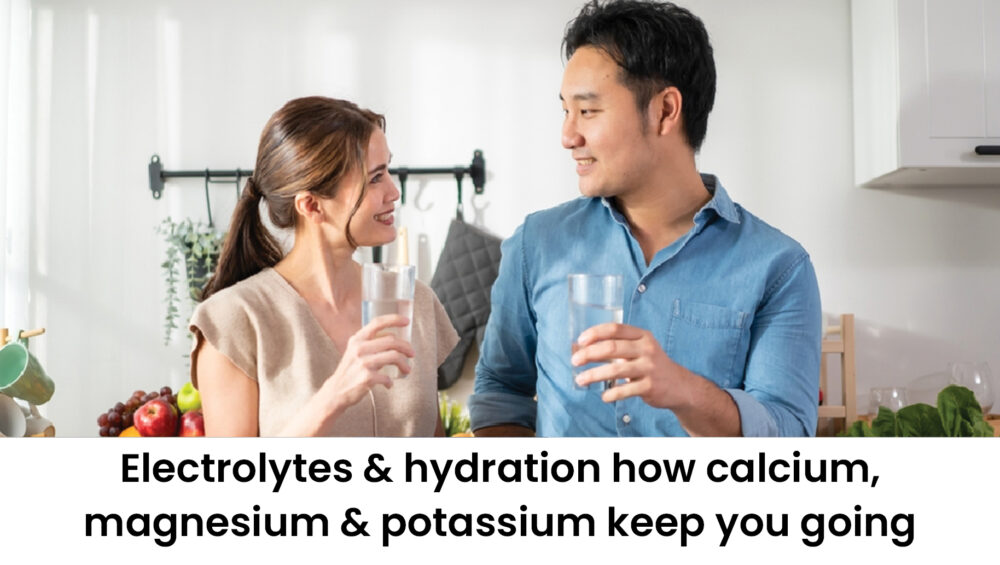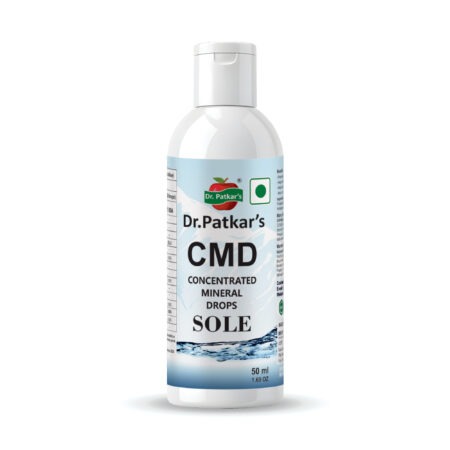Electrolytes & Hydration How Calcium, Magnesium, and Potassium Keep You Going

Electrolytes play a crucial role in keeping our bodies hydrated, maintaining muscle function, and supporting nerve signaling. Among the most important electrolytes are calcium, magnesium, and potassium. These minerals work together to regulate hydration, prevent muscle cramps, and enhance overall performance. In this blog, we will explore how these electrolytes keep you going and the best ways to ensure you’re getting enough.
The Role of Electrolytes in Hydration
Electrolytes are minerals that carry an electrical charge and help maintain fluid balance within the body. They are essential for proper hydration and bodily functions. Calcium, magnesium, and potassium play a significant role in preventing dehydration, supporting energy levels, and optimizing athletic performance.
View the product: Dr.Patkar’s Concentrated Mineral Drops
How Calcium, Magnesium, and Potassium Support Hydration & Performance
1. Calcium: More Than Just Bone Health
- Regulates muscle contractions and prevents cramps
- Supports nerve function and signal transmission
- Aids in the release of energy from food
- Helps maintain proper fluid balance in the body
2. Magnesium: The Muscle & Nerve Booster
- Relaxes muscles and prevents spasms
- Enhances energy production and reduces fatigue
- Supports electrolyte balance for optimal hydration
- Regulates nerve impulses to maintain proper coordination
3. Potassium: The Hydration Powerhouse
- Helps retain fluid and prevent dehydration
- Regulates blood pressure and supports heart health
- Prevents muscle cramps and improves endurance
- Works with sodium to balance electrolytes
Signs of Electrolyte Imbalance
An imbalance of calcium, magnesium, or potassium can lead to dehydration, fatigue, and muscle weakness. Common signs include:
- Frequent muscle cramps or spasms
- Fatigue and dizziness
- Irregular heartbeat
- Numbness or tingling sensations
- Weakness or difficulty concentrating
View the product: Dr.Patkar’s Concentrated Mineral Drops
Best Sources of Electrolytes
1. Calcium-Rich Foods
- Dairy products (milk, yogurt, cheese)
- Leafy greens (kale, spinach, bok choy)
- Almonds and chia seeds
- Fortified plant-based milk (almond, soy, oat)
2. Magnesium-Rich Foods
- Nuts and seeds (almonds, pumpkin seeds, sunflower seeds)
- Whole grains (brown rice, quinoa, oatmeal)
- Dark leafy greens (spinach, Swiss chard)
- Avocados and bananas
3. Potassium-Rich Foods
- Bananas and oranges
- Sweet potatoes and white potatoes
- Beans and lentils
- Coconut water
How to Maintain Optimal Hydration
- Drink enough water: Hydration starts with adequate water intake.
- Balance electrolyte intake: Consume a mix of calcium, magnesium, and potassium daily.
- Avoid excessive caffeine and alcohol: These can deplete electrolyte levels.
- Use electrolyte supplements when needed: If you sweat a lot or engage in intense physical activity, electrolyte supplements can help maintain balance.
Electrolytes like calcium, magnesium, and potassium are essential for hydration, energy, and overall health. By incorporating electrolyte-rich foods into your diet and staying hydrated, you can optimize your body’s performance and well-being. Whether you’re an athlete or just looking to maintain proper hydration, these minerals are key to keeping you going strong.
View the product: Dr.Patkar’s Concentrated Mineral Drops




